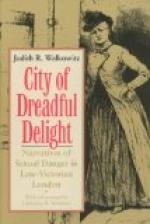She slipped by him without a sound and hurried down into the darkest corner of the cavern.
Circumstance had found her in her refuge and would drive her away from this sweet home back to that hateful house, to the man she did not love!
For many days, with increasing distress, Laodice avoided Nathan, the Christian. With that fascinated terror which at times forces human creatures to examine a peril, she felt irresistibly impelled to try his memory of events, that she might know if indeed he would recognize her.
Though she turned cold and flashed white when he came upon her one day in the darkness of their shelter, she felt nevertheless the relief of approaching a solution to her perplexity.
“They tell me,” he said with the deliberate speech of the old, “that Titus is once more permitting citizens to depart from Jerusalem unharmed.”
“Then,” she said, grasping at this hope, “why do you stay here in this peril?”
“Why should I leave it? Even with the singers who wept by the waters of Babylon, I prefer Jerusalem above my chief joy. Except for the time when we of the Way were warned to depart, I have been in Jerusalem all my life. Then, though I had gone as far as Caesarea on my way to Antioch to join the brethren there, homesickness overtook me and I turned in my tracks, saying no man farewell, and came back.”
“A weary journey for one so old,” she said gently.
Would he remember also that it had been dangerous?
“Nay, but a journey full of works and reward. And I discovered at the end of it that I had lived in error forty years; that Christ never ceases to prove Himself.”
Already the forbidden tenets of the Nazarene faith had entered into his words. But feeling somehow that her deflection from uprightness covered her whole life, there was no reason why she should not hear what these people believed and have done with it.
“Art thou a Christian?” she asked timidly.
“I am a believer in Christ, but whether I may call myself one of the blessed I do not know, for they have had faith. But I demanded a sign. Behold it! The ruin of the City of David!”
Her eyes widened with alarm.
“Is there no hope?” she exclaimed.
He looked at her, even in his old age impressed with the immense importance life and love must have to so beautiful and beloved a woman. Presently he said, as if to himself:
“Yea, be thou blessed, O thou Redeemer, that givest life to them to whom life is dear and death approacheth.”
Her concern for concealment vanished entirely in her rising terror for the future of the Holy City.
“I pray thee, Rabbi,” she said in a low voice, drawing close to him, “tell me what thy people believe about the city. I have heard—but it can not be true!”
“Do not be troubled about the city,” he answered. “Ask me rather how to become safeguarded against any disaster, greater even than the fall of cities.”




